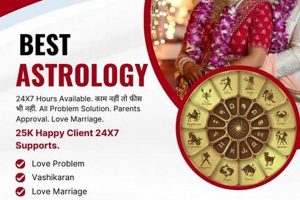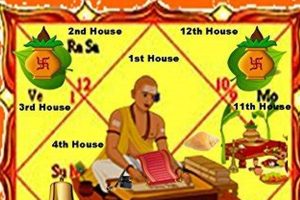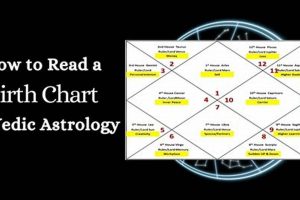A high-quality Vedic astrological birth chart, calculated accurately for a specific time and place of birth, serves as a personalized cosmic map. It depicts the positions of celestial bodies at the moment of birth, providing a framework for understanding an individual’s personality, tendencies, and potential life path. For example, a chart might highlight strong placements in houses related to career, suggesting a natural inclination toward professional achievement.
In Vedic tradition, this personalized celestial snapshot is considered a valuable tool for self-discovery and guidance. It offers potential insights into various life aspects, including relationships, finances, and health. Historically rooted in ancient Indian scriptures, this practice continues to be valued for its potential to illuminate one’s strengths and weaknesses, aiding in informed decision-making and personal growth.
The following sections will delve further into the key components of such a chart, exploring its interpretive layers and practical applications for navigating life’s journey.
Tips for Utilizing a Vedic Astrological Birth Chart
A Vedic astrological birth chart offers valuable insights, but its potential is maximized when approached thoughtfully. These tips provide guidance for navigating and interpreting the chart effectively.
Tip 1: Ensure Accurate Birth Data: Chart accuracy hinges on precise birth time, date, and location. Even slight variations can significantly impact the calculations and subsequent interpretations.
Tip 2: Consult with a Qualified Practitioner: While self-study can be beneficial, the intricacies of Vedic astrology are best navigated with guidance from an experienced professional. They can provide personalized interpretations and address specific questions.
Tip 3: Focus on the Whole Chart: Avoid fixating on isolated planetary placements. Consider the interplay between planets, houses, and signs for a comprehensive understanding.
Tip 4: Understand the Dasha System: The Dasha system outlines planetary periods influencing specific life phases. Awareness of these periods can offer valuable context for current events and future trends.
Tip 5: Integrate Astrological Insights with Self-Reflection: The chart serves as a guide, not a deterministic blueprint. Combine astrological insights with personal reflection and informed decision-making.
Tip 6: Avoid Fatalistic Interpretations: Vedic astrology emphasizes free will and the potential for growth. View the chart as a tool for understanding tendencies, not as a predictor of fixed outcomes.
By applying these tips, individuals can harness the power of a Vedic astrological birth chart to gain self-awareness, navigate life’s challenges, and make informed choices.
These insights pave the way for a deeper exploration of Vedic astrology and its practical applications in personal development and life planning.
1. Accurate Birth Data
Accurate birth data is the cornerstone of a reliable and insightful Vedic astrological chart. The precision of this information directly impacts the chart’s accuracy and, consequently, the validity of any interpretations derived from it. Without accurate birth data, even the most skilled astrologer cannot generate a chart that reflects the individual’s unique cosmic blueprint.
- Time of Birth:
The exact time of birth is crucial as the positions of celestial bodies change rapidly. A difference of even a few minutes can alter the Ascendant (rising sign) and the placement of planets within the houses, leading to significant variations in interpretation. For instance, someone born just before sunrise might have a different Ascendant than someone born just after, impacting their personality and life path as understood through the chart.
- Date of Birth:
While seemingly straightforward, the date of birth confirms the position of the Sun and other slower-moving planets. Accuracy here ensures the correct planetary placements within the signs, influencing the individual’s core characteristics and karmic predispositions.
- Place of Birth:
The location of birth determines the specific geographic coordinates used for calculating the rising sign and house cusps. Different locations have different time zones and latitudinal/longitudinal coordinates, leading to variations in the chart even with the same date and time of birth. This is why someone born in London at the same moment as someone born in Delhi will have different astrological charts.
- Time Zone:
Precise time zone information is essential, especially in contemporary times with various time zones and daylight saving adjustments. Accurate time zone data ensures that the birth time is correctly converted to Greenwich Mean Time (GMT), the standard reference point for astrological calculations. Failing to account for daylight saving, for example, can introduce an hour’s difference, significantly impacting the chart’s accuracy.
These components of birth data work in concert to create a precise representation of the celestial configuration at the moment of birth. Any inaccuracies in these details compromise the integrity of the chart and diminish its potential to provide meaningful insights. Therefore, obtaining and utilizing precise birth data is paramount for constructing a Vedic astrological chart that serves as a reliable guide for self-discovery and understanding one’s life path.
2. Qualified Astrologer
A qualified Vedic astrologer plays a pivotal role in generating and interpreting a high-quality birth chart. While accurate birth data provides the foundation, the astrologer’s expertise unlocks the chart’s potential, transforming raw celestial data into meaningful insights. The astrologer’s qualifications directly impact the quality of analysis and the depth of understanding derived from the chart.
- Profound Understanding of Vedic Principles:
A qualified astrologer possesses a deep understanding of Vedic astrological principles, including planetary influences, house significations, sign characteristics, and the intricate interplay between these elements. This knowledge extends beyond textbook definitions to encompass the nuanced application of these principles in diverse life contexts. For example, understanding the subtle differences between the placement of Mars in Aries versus Mars in Scorpio requires more than just knowing the general characteristics of Mars and the two signs; it involves appreciating the specific energetic dynamics created by each placement.
- Experience in Chart Interpretation:
Practical experience in chart interpretation is crucial. Analyzing numerous charts over time hones the astrologer’s ability to synthesize complex information and identify significant patterns. This experience allows for more nuanced and personalized interpretations, moving beyond generalized predictions to offer specific insights relevant to the individual’s unique circumstances. For example, an experienced astrologer can discern the potential career paths best suited for an individual based not just on the 10th house but also by considering planetary aspects, the Navamsa chart, and the Dasha system.
- Ethical Practice and Client Focus:
A qualified astrologer adheres to ethical principles, prioritizing the client’s well-being and providing guidance with integrity and sensitivity. This involves clear communication, respecting client confidentiality, and avoiding deterministic predictions. Instead of simply forecasting events, a responsible astrologer empowers clients to understand their strengths and weaknesses and make informed decisions aligned with their life goals.
- Continuous Learning and Development:
Vedic astrology is a vast and complex field. A qualified astrologer demonstrates a commitment to ongoing learning and professional development, staying abreast of current research and refining their interpretive skills. This commitment ensures that their knowledge remains relevant and that they can offer clients the most accurate and insightful guidance possible.
These combined facets contribute to the creation of a high-quality Vedic astrological chart that provides valuable insights into an individual’s life path. A qualified astrologer acts as a skilled interpreter, translating the complex language of the cosmos into practical guidance for self-discovery, personal growth, and informed decision-making. The astrologer’s expertise enhances the value of the chart, ensuring that its potential is fully realized for the benefit of the individual.
3. Comprehensive Analysis
A comprehensive analysis distinguishes a high-quality Vedic astrological chart from a superficial reading. It moves beyond isolated planetary placements to consider the intricate web of relationships between planets, houses, signs, and other astrological factors. This holistic approach provides a deeper understanding of the chart’s nuances and allows for more accurate and insightful interpretations. Comprehensive analysis forms the bridge between raw astrological data and practical application in an individual’s life.
- Integration of Planetary Relationships:
Planetary relationships, or aspects, are crucial. Analyzing these relationships reveals how planets influence one another, modifying their individual expressions. For example, a benefic aspect from Jupiter to Saturn can mitigate Saturn’s restrictive tendencies, while a challenging aspect from Mars to Venus might introduce conflict in relationships. Understanding these interactions provides a more nuanced understanding of the chart’s dynamics.
- House and Sign Considerations:
Planets express their energies through the houses they occupy and the signs they reside in. A planet’s placement in a specific house indicates the area of life where its influence is most prominent, while its sign placement modifies its expression. For example, Venus in the 7th house signifies a focus on relationships, but Venus in Aries in the 7th house might suggest a more assertive and independent approach to partnerships.
- Incorporation of Divisional Charts:
Vedic astrology utilizes divisional charts, or Vargas, which offer specialized insights into specific life areas. The Navamsa chart, for instance, provides a deeper understanding of marriage and partnerships, while the Dasamsa chart sheds light on career and vocation. Integrating these divisional charts into the analysis provides a more comprehensive picture of the individual’s potential.
- Application of the Dasha System:
The Dasha system outlines planetary periods that influence different phases of life. Understanding the current and upcoming Dashas provides valuable context for interpreting planetary transits and predicting potential life events. For example, a challenging period indicated by the Dasha system can provide insight into potential obstacles or areas requiring attention during a specific timeframe.
A comprehensive analysis weaves these elements together, creating a multi-layered understanding of the individual’s astrological blueprint. This in-depth approach is essential for generating a best Vedic astrology chart that offers valuable insights for self-discovery, navigating life’s complexities, and making informed decisions aligned with one’s highest potential. It transforms the chart from a static representation of planetary positions into a dynamic tool for understanding and navigating life’s journey.
4. Personalized Interpretation
Personalized interpretation is a cornerstone of a best Vedic astrology chart. Generic astrological readings offer broad strokes, but a personalized interpretation tailors the analysis to the individual’s unique birth chart, life circumstances, and aspirations. This crucial distinction elevates the chart from a general overview to a deeply relevant and insightful guide. The interpretation becomes not just about what the planets signify but about how those significations manifest in the individual’s specific life. Cause and effect are explored not as deterministic pronouncements but as potential tendencies and opportunities for growth.
Consider, for instance, two individuals born with Saturn in the 10th house. A generic interpretation might suggest career challenges or delays. However, a personalized interpretation would consider other planetary influences, the sign Saturn occupies, and the individual’s specific career aspirations. For one individual, this placement might manifest as a slow but steady climb to success in a traditional field, while for another, it might indicate a non-traditional career path with periods of self-employment or freelance work. The personalized approach acknowledges that while Saturn in the 10th house represents a shared astrological influence, its real-life expression varies greatly depending on the individual’s unique chart and life context.
The practical significance of personalized interpretation lies in its empowering potential. It shifts the focus from fatalistic predictions to informed decision-making. Instead of passively accepting planetary influences, individuals gain the ability to navigate life’s challenges with greater awareness and agency. This understanding fosters self-awareness, facilitates informed choices, and encourages proactive engagement with one’s life path. It transforms the Vedic astrology chart from a static document into a dynamic tool for personal growth and fulfillment. Challenges are reframed as opportunities for learning and development, and the chart becomes a roadmap for navigating life’s journey with greater clarity and purpose. The best Vedic astrology charts, therefore, are those that offer not just accurate calculations but also insightful, personalized interpretations that empower individuals to live more consciously and purposefully.
5. Consideration of Dashas
The Dasha system, a cornerstone of Vedic astrology, provides a crucial temporal dimension to birth chart analysis. In the context of a best Vedic astrology chart, incorporating Dashas is essential for understanding the unfolding of karmic influences and planetary periods over time. Dashas provide a framework for anticipating potential life events and navigating specific periods with greater awareness. A best Vedic astrology chart integrates this dynamic system to offer a more comprehensive and practical roadmap for life’s journey.
- Planetary Periods and Life Phases:
Each Dasha represents a specific planetary period, ranging from several months to many years. These periods correlate with distinct life phases and experiences. For example, a Jupiter Dasha often signifies a time of growth, expansion, and good fortune, while a Saturn Dasha may bring challenges, discipline, and karmic lessons. Understanding the current and upcoming Dashas provides invaluable context for interpreting transits and anticipating potential life events. A best Vedic astrology chart utilizes this knowledge to offer tailored guidance for navigating specific periods.
- Predictive Potential and Timing of Events:
Dashas offer valuable predictive insights by indicating the timing of potential life events. While the birth chart reveals predispositions and tendencies, Dashas help pinpoint when these tendencies might manifest. For example, a Dasha ruled by a planet associated with career might indicate a period of professional advancement, while a Dasha ruled by a planet associated with relationships might signify a time of significant romantic developments. Integrating Dashas enhances a chart’s predictive accuracy, providing a more precise timeframe for potential events.
- Mitigation of Challenging Periods:
Dashas offer proactive strategies for mitigating challenging periods. By understanding the nature of the ruling planet and its influence during a specific Dasha, individuals can take steps to minimize potential difficulties. For example, during a challenging Mars Dasha, practicing anger management techniques or engaging in physical activity can help channel Mars’s fiery energy constructively. A best Vedic astrology chart utilizes Dashas to offer personalized recommendations for navigating difficult periods with greater ease and resilience.
- Maximizing Favorable Opportunities:
Conversely, understanding favorable Dashas allows individuals to maximize opportunities for growth and fulfillment. By recognizing the potential benefits associated with a specific planetary period, individuals can make informed decisions and take proactive steps to harness positive influences. For example, during a beneficial Venus Dasha, pursuing creative endeavors, focusing on relationships, or engaging in activities that enhance beauty and harmony can amplify Venus’s positive effects. A best Vedic astrology chart utilizes Dasha analysis to empower individuals to capitalize on favorable periods and manifest their full potential.
By incorporating Dashas, a best Vedic astrology chart provides not just a static snapshot of planetary positions but a dynamic understanding of how these influences unfold over time. This temporal dimension adds depth and practicality to the chart, offering valuable insights for navigating life’s journey with greater awareness, purpose, and resilience. The consideration of Dashas transforms the chart into a powerful tool for personal growth, empowering individuals to make informed choices and navigate life’s transitions with greater clarity and confidence.
6. Integration with Free Will
A best Vedic astrology chart acknowledges the crucial role of free will in shaping an individual’s destiny. While planetary placements and astrological influences offer insights into inherent tendencies and potential life paths, they do not dictate fixed outcomes. Free will represents the capacity to make choices and take actions that can modify the expression of these influences. Integrating free will into the interpretation of a Vedic astrology chart transforms it from a predictive tool into an empowering guide for self-discovery and conscious living. Cause and effect within this framework are not viewed as deterministic but rather as a complex interplay between inherent predispositions and conscious choices. For instance, an individual with a challenging placement in the area of finances might be predisposed to financial instability. However, through disciplined financial planning and conscious spending habits, this individual can mitigate potential challenges and create greater financial security.
The importance of integrating free will lies in its empowering potential. Recognizing the capacity to influence one’s life path fosters a sense of agency and responsibility. Instead of feeling limited by astrological indicators, individuals gain the ability to navigate life’s circumstances with greater awareness and intentionality. This understanding has profound practical significance. It encourages individuals to take ownership of their lives and make choices aligned with their values and aspirations. Real-life examples abound: an individual aware of a predisposition towards anger might actively practice anger management techniques; someone aware of a tendency towards procrastination might develop strategies for improved time management and productivity. By acknowledging and integrating free will, individuals can consciously shape their destinies and cultivate greater self-mastery.
In essence, a best Vedic astrology chart serves not as a deterministic blueprint but as a navigational tool. It provides insights into inherent tendencies, potential challenges, and opportunities for growth, but it also emphasizes the individual’s capacity to make conscious choices that can modify the expression of these influences. This understanding transforms the chart from a passive predictive instrument into an active tool for self-discovery, personal growth, and empowered living. The integration of free will, therefore, becomes a critical component in maximizing the benefits of Vedic astrology and enabling individuals to live more consciously and purposefully.
Frequently Asked Questions about High-Quality Vedic Astrology Charts
This section addresses common inquiries regarding the creation and interpretation of high-quality Vedic astrology charts, aiming to clarify potential misconceptions and provide practical guidance.
Question 1: How does one ensure the accuracy of birth data for chart creation?
Obtaining accurate birth data is crucial. Birth certificates provide reliable information for date and place of birth. For precise birth time, hospital records or family documentation are ideal. Rectification techniques can be employed when exact birth times are unknown, but these require specialized expertise.
Question 2: What distinguishes a qualified Vedic astrologer from an unqualified one?
A qualified astrologer possesses a deep understanding of Vedic principles, extensive experience in chart interpretation, and a commitment to ethical practice. Look for credentials, client testimonials, and a focus on personalized guidance rather than generic predictions.
Question 3: Can Vedic astrology predict the future with certainty?
Vedic astrology offers insights into potential tendencies and life paths, but it does not offer deterministic predictions. Free will plays a significant role, and individuals have the capacity to make choices that influence outcomes. The chart serves as a guide, not a fixed script.
Question 4: What is the significance of the Dasha system in chart analysis?
The Dasha system outlines planetary periods influencing different life phases. Understanding these periods provides valuable context for interpreting transits and anticipating potential events, offering a temporal dimension to chart analysis.
Question 5: How can one integrate astrological insights with personal growth?
Astrological insights can be used for self-awareness and informed decision-making. The chart highlights strengths and weaknesses, empowering individuals to make choices aligned with their potential. It serves as a tool for self-discovery, not a limitation.
Question 6: Are there cultural considerations when interpreting a Vedic chart?
While Vedic astrology’s principles are universal, cultural nuances can influence the expression of astrological influences. A skilled astrologer considers these factors to provide culturally sensitive and relevant interpretations.
Understanding these key aspects empowers individuals to approach Vedic astrology with greater clarity and discernment, maximizing its potential benefits for self-understanding and navigating life’s journey.
The next section will explore practical applications of Vedic astrology in various life areas.
Conclusion
A high-quality Vedic astrological birth chart, meticulously calculated and expertly interpreted, offers valuable insights into an individual’s life path. Accuracy of birth data, the astrologer’s qualifications, comprehensive analysis incorporating planetary relationships, house and sign placements, divisional charts, and the Dasha system are crucial elements contributing to chart quality. Personalized interpretation, rooted in the individual’s unique circumstances and aspirations, transforms astrological data into relevant guidance. Crucially, integrating free will into the interpretation empowers individuals to navigate life’s journey with greater awareness and agency, recognizing the capacity to make choices that shape one’s destiny.
The potential of a well-crafted Vedic astrological chart extends beyond mere prediction; it serves as a powerful tool for self-discovery, personal growth, and informed decision-making. By understanding inherent tendencies and potential life paths, individuals gain the ability to navigate life’s complexities with greater clarity and purpose. The pursuit of a best Vedic astrology chart represents not an attempt to control fate, but an opportunity to understand and engage with life’s journey more consciously, ultimately empowering individuals to create a life aligned with their highest potential.







